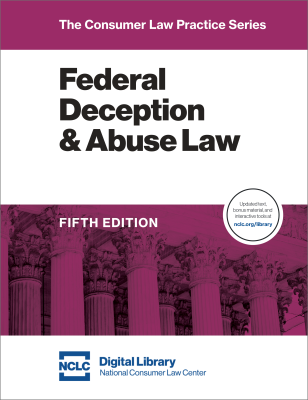This article provides a summary and link to a Public Justice paper that debunks claims (successful in two district courts and popping up everywhere now) that the Telephone Consumer Protection Act (TCPA) is unconstitutional as applied to all robocalls from 2015 to July 6, 2020.
Rulings on TCPA Constitutionality
The TCPA prohibits robocalls to cell phones, but in 2015 Congress amended the law to create an exception for robocalls made to collect government debt. On July 6, 2020, the Supreme Court held that the government-debt exception to the prohibition on robocalls to cell phones “impermissibly favored debt-collection speech over political and other speech, in violation of the First Amendment.” Barr v. Am. Ass’n of Political Consultants, Inc., 140 S. Ct. 2335, 2343 (2020). Applying severability principles, the Court also concluded that “the entire 1991 robocall restriction should not be invalidated, but rather that the 2015 government-debt exception must be invalidated and severed from the remainder of the statute.” Id. For more on the Barr v. AAPC decision, see NCLC’s Federal Deception Law § 6.2.4.3.
Two recent district court decisions have turned that severability conclusion on its head, holding that the entirety of the TCPA’s prohibition on robocalls was unconstitutional. The courts adopted a twisted interpretation of AAPC that immunizes from liability any party that made a robocall after the government-debt exception was enacted in 2015, but before final judgment was entered in Barr v. AAPC. See Lindenbaum v. Realgy, L.L.C., 2020 WL 6361915, at *2 (N.D. Ohio Oct. 29, 2020); Creasy v. Charter Commc’ns, Inc., 2020 WL 5761117, at *3 (E.D. La. Sept. 28, 2020).
Motions to dismiss based on this distorted interpretation of Supreme Court precedent are now popping up in TCPA cases across the country. The Lindenbaum and Creasy decisions, if applied more broadly, would do no less than eliminate liability for TCPA robocall violations that took place between 2015 and July 6, 2020. At their core, Lindenbaum and Creasy reflect a fundamental misunderstanding about the doctrine of severability that directly conflicts with the Supreme Court’s decision in Barr v. AAPC as well as longstanding principles that govern how courts should cure statutes with constitutional defects.
Public Justice Paper Debunks District Court Rulings on Constitutionality
A recent paper issued by Public Justice explains why the Creasy and Lindenbaum approach is not just wrong, but would unsettle longstanding legal doctrines.
Part I summarizes the Supreme Court’s AAPC decision and the recent district court decisions, Creasy and Lindenbaum, that rely on AAPC in erecting a new barrier to holding corporations accountable for unlawful robocalls made in the last five years.
Part II explains why Creasy and Lindenbaum are in direct conflict with AAPC’s holding that only the government-debt exception was unconstitutional, not the entire TCPA robocall ban.
Part III contends that Creasy and Lindenbaum conflict with longstanding Supreme Court precedent that a severability determination is a controlling interpretation of law that must apply retroactively. Specifically, this Part explains that:
- • All severability decisions are controlling interpretations of federal law that must be given full retroactive effect under Harper v. Virginia Dep’t of Taxation;
- • The retroactive effect of a decision to sever is especially clear where, as here, the Supreme Court severs an unconstitutional amendment to an otherwise lawful statute; and
- • In this particular TCPA context, the Supreme Court in AAPC, the Ninth Circuit, and numerous other courts have held that severing the government-debt exception from the general prohibition on robocalls means that parties who made robocall violations over the last five years are still liable.
Part IV argues that, regardless of whether AAPC controls or how a district court wants to characterize severability, longstanding principles governing judicial remedies for constitutionally defective statutes weigh heavily against eliminating all liability under the TCPA robocall ban over the last five years.
For More Assistance
For case-specific inquiries, contact Public Justice staff attorney Ellen Noble at [email protected]. For more detail on the TCPA generally, see NCLC’s Federal Deception Law Chapter 6.
Additional Resources
Boisvert v. Carnival Corp., 2021 U.S. Dist. LEXIS 47397 (M.D. Fla. Mar. 12, 2021) (abandoning previous view that statute was unconstitutional until government debt exception was struck down).
Less v. Quest Diagnostics Inc., Case No. 3:20 CV 2546 (N.D. Ohio Jan. 26, 2021)
Stoutt v. Travis Credit Union, 2021 U.S. Dist. LEXIS 6019 (E.D. Cal. Jan. 12, 2021) (denying Creasy motion).
Trujillo v. Free Energy Savings Co., L.L.C., Case No. 5:19-cv-02072-MCS-SP (C.D. Cal. Dec. 21, 2020) (denying Creasy motion).
Alexander Shen v. Tricolor California Auto Group, L.L.C., Case No. CV 20-7419 PA (C.D. Cal. Dec. 17, 2020) (excellent recent decision with detailed rebuttal of claim that TCPA was unconstitutional before AAPC struck down and severed the government debt collection amendment).
Abramson v. Federal Ins. Co., Case No. 8:19-cv-2523-T-60AAS, 2020 WL 7318953 (M.D. Fla. Dec. 11, 2020) (excellent recent decision finding TCPA constitutional as applied to robocalls from 2015–2020).
Response to Motion to Dismiss for Lack of Jurisdiction in Case Regarding Constitutionality of TCPA After AAPC Decision (2020) (note this brief is available to subscribers of NCLC’s Federal Deception Law and also to subscribers to NCLC’s Consumer Law Pleadings).
Response to Motion to Dismiss First Amended Class Action Complaint for Lack of Subject Matter Jurisdiction (note this brief is available to subscribers of NCLC’s Federal Deception Law and also to subscribers to NCLC’s Consumer Law Pleadings).
NCLC's Federal Deception Law Chapter 6 (comprehensive analysis of the TCPA and TCPA caselaw, updated digitally).


